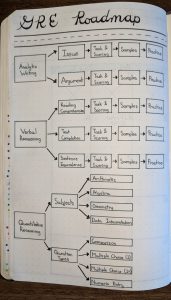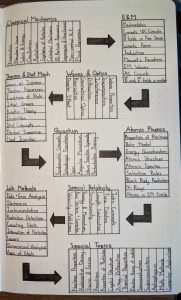January 2019 has begun, which means that I am currently in the middle of winter break, the month in between the fall and spring semesters with little stress and few worries. Or at least it’s advertised to be that way. As a senior physics major with her sights set on graduate school, this “break” isn’t much of a break for me, but is rather an amount of time allotted for me to begin my preparations for applying to graduate school.
One of the things that most students have to do in order to be accepted in to graduate school is to take the Graduate Record Examinations, or the GRE. I have never had a very good history with standardized tests, so needless to say I am not excited to take this exam. However, the time I have for winter break allows me to begin my preparations for the GRE, and do what I can to feel as confident as possible when I take the exam. I will be taking both the General GRE, and the Physics GRE (since those are the ones required by most graduate programs in physics), so those are the two exams that I will be spending my time preparing for.
So far I have done some research on the material covered on both the General and the Physics GRE exams, and have devised an approach to feel comfortable with it. This test can be very overwhelming since it covers a wide range of topics, so I have broken down every piece of it into smaller chunks, and will approach my studying by covering one chunk at a time. I mentioned in a previous post that I intend to use my bullet journal for just about everything, so I have set aside two pages in it where I have drawn out roadmaps for the GRE:

Above is my roadmap for studying for the General GRE test. As shown, it has three major parts: Analytic Writing, Verbal Reasoning, and Quantitative Reasoning.
The Analytic Writing section has two tasks: one that has the student write a short essay analyzing a given issue, and the other one has the student write a short essay analyzing a given argument. For each task in the analytic writing section, my intention is to first understand what specifically is expected to be done when given a prompt, and how a submission for the task is scored. Next I want to look at some samples from past GRE tests, and understand why they received the score that they did. Finally, I’ll spend some time practicing these two tasks using the materials I’ve gathered.
The verbal reasoning section of the test has three parts: Reading Comprehension, Text Completion, and Sentence Equivalence. My plan of approach for this section is similar to my plan for the analytic writing section, where I spend some time understanding the task of each part and how they’re being scored, look at some samples from past exams, and then practice.
The quantitative reasoning section of the test is a little different from the other two. This section contains four different question types (comparison, multiple choice (select one), multiple choice (select one or more), and numeric entry), and covers four different areas in math (arithmetic, algebra, geometry, and data interpretation). I’ve laid out my approach to this section a little differently, where I spend some time familiarizing myself with both the subjects covered, and the types of questions being posed, and then complete plenty of practice questions with the goal of being able to answer them as efficiently and accurately as possible.

Above is my roadmap for studying for the Physics Subject Test. This test covers nine major areas in physics (classical mechanics, electromagnetism, waves and optics, thermodynamics and statistical mechanics, quantum mechanics, atomic physics, special relativity, lab methods, and special topics), each of which cover a wide range of more specific topics and concepts. This roadmap is a complete breakdown of all of the topics on the physics subject test, where the large boxes represent each of the major subjects covered, and are further divided to represent the more specific topics.
My plan of action for this subject test is to familiarize myself with each of these topics, and answer a bunch of practice questions with the goal of being able to complete these questions as efficiently and accurately as possible. This roadmap makes the volume of material on this test seem very high, which is true, however there are some topics that appear way more often than others. For example, classical mechanics and electromagnetism appear on the test the most, and lab methods and special relativity appear on the test less. Therefore, my studying will be prioritized based on how much each subject is seen on the test.
I hope that reading my blog posts on the GRE will help those who plan on taking the test in the future, and remind those who are studying for it and taking it are not along with their suffering. I’ll make sure to keep posting updates on my progress!

Great post!
Please suggest the road map for studying for the gre biology subject test
Can u please share the books or material ur referring for the gre
Thank you